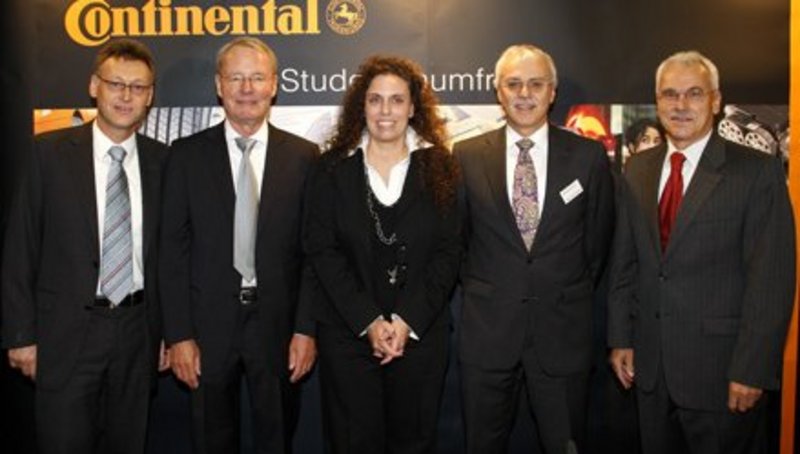6th “Continental Student Survey”
State Has Done More Than Necessary in the Crisis - But Should Get More Involved in Key Industries
- Majority of university graduates for redefining market rules
- Continuing recession does not dampen assessment of career opportunities
Hanover/Berlin, September 4, 2009. In the course of the ongoing financial and economic crises, the state has done “more than necessary” in the opinion of some 42% of German students this summer. At the beginning of the year, just under 24% were of this opinion. Whereas in the summer one in four university graduates thought that the government acted “absolutely correctly,” at the beginning of the year it was still nearly one in three. Only a shrinking minority thought that the government had done “too little”. At the same time, about half of the university graduates called for the public sector to get more involved in key industries. Despite the serious recession, graduates assess their own career prospects as “good” or “very good” in general.
These are the findings of the representative 6th “Continental Student Survey” of prospective engineers, scientists and economists presented by the international automotive supplier on September 4 in Berlin. TNS/Infratest queried around 1,000 students as to their opinions on careers, the work world and university topics. Another central topic this year was the students’ assessment of various aspects of the economic crisis. For that reason, the Continental for the first time had the survey taken in two stages: The first comprehensive survey in January was followed by a subsequent survey at the end of June and early in July to demonstrate any possible shift in opinions as the recession progressed.
“As an internationally positioned technology company headquartered in Germany, this year we have intentionally focused on the recession in our study, which is designed to extend over many years: As an automotive supplier, we have of course also been hit by the recession, which is why we are all the more interested in knowing how our potential future high performers in research and development as well as in management view this topic. And that is why we feel it is a positive sign that, compared with results from many other years, the German graduates’ assessment of their career prospects is on the whole very positive and has not changed despite the economic crisis. The students obviously accept the challenges of restructuring an ‘antiquated’ economic field or in part creating something new,” said Continental’s CHRO Heinz-Gerhard Wente.
74% of the students view their career prospects to be “very good” or “good”, whereby the men, at 80.8%, are even one percentage point higher than the value in 2008. The students’ assessment of their personal competitive strength as “very good” or “good” has risen further, missing the top value in 2006 by just 1.3 percentage points (57.7%). Despite this fundamental self-assurance, half of those surveyed (January 50% / June/July 52%), believe that the crisis will make it more difficult for them to get started in their careers. The aspect most commonly specified for this negative assessment: difficulties in landing the preferred job (January 5.3% / June/July 21.2%).
“The students now assess their career prospects as good. And that will continue to be the case if they maintain a knowledge edge by learning throughout their life.” says Prof. Sabine Remdisch, Vice President of the Leuphana Universität Lüneburg and responsible for the "Life-long Learning“ department, commenting on the students' career prospects.
When asked about the financial markets, some 40% (January 38.4% / June/July 41.9%) of those surveyed said that their knowledge was “good”. About one third (January 33.8% / June/July 35.5%) feel that they can keep up their side of a conversation on the market system in a globalized world. In contrast, a good two thirds (January 62% / June/July 63.5%) said that they do not know enough about the control and regulation of the financial markets.
More than half (January 52.2% / June/July 52.1%) of the students is of the opinion that the market rules must be redefined or newly created in the framework of globalization. When asked, 18.7% (June/July 6.3%) said they felt that there needs to be a change in the state regulation and/or control. 11.5% (June/July 10.2%) are in favor of restricting or forbidding (highly)-speculative, risky financial products. Nearly one third (January 27.7% / June/July 28.5%) feels that they cannot or would not like to comment on the redefinition of the market rules.
About half of those asked (January 51.7% / June/July 46%) call for the state to get more involved in the key industries –like the automotive industry, the engine building industry, and utility companies– and thus ensure that it has more influence. 31.4% (January), and 38.2% (June/July) were of the opinion that the state should stay out of the economy. This opinion prevailed primarily amongst economists (January 42.3% / June/July 47.1%), whereby just underone in three scientists (January 25.6% / June/July 32.9%) felt this way.
“I am impressed by the fact that the majority of those surveyed felt the state had done more than enough to come to grips with the crisis. This should sink into the heads of those politicians who see in the crisis a mandate to turn our economy and social system inside out!” commented Prof. Hans-Olaf Henkel, honorary doctor and senior advisor to the Bank of America. Dr. Wilfried Prewo, chief executive officer of the Chamber of Industry and Commerce [IHK] in Hanover added: “The Conti study emphatically points up one thing: The largest proportion of students by far sees its future in a private company. That is a clear indication of solid confidence in the market economy. A good two-thirds of prospective economists, engineers or scientists do not place any value in working for a state-regulated company or one that may even be state-controlled.”
Students are split on the topic of limiting manager salaries. In January, 54.1% and in June/July 48.7% of those surveyed thought that it should be up to the company to determine manager salaries and not the state. 41.5% (January) or 48.2% (June/July) however are convinced that manager salaries should be limited by law. In January, this limit was specified on the average at €575,000, in June/July at €608,000. The findings differed depending on the various fields and the time the survey was taken: Scientists specified an average of €543,000/€561,000, economists €520,000/€754,000, and engineers €751,000/€712,000.
When asked about the misconduct of the elite in conjunction with the financial crisis, the majority of the students are of one opinion: They feel that an excessively high willingness to take risks without having to take the consequences (January 62.7% / June/July 61.3%) and insufficient liability on the part of those responsible (January 55.6% / June/July 58.8%) encourage wrongdoing. The concealment of the true circumstances (January 61.8% / June/July 60.6%) and the dishonesty of the protagonists (January 59.6% / June/July 55.9%) were also mentioned.
Another section of the survey deals with the topic of ethics. When they hear this word, university graduates associate morality (45.3%), respectable behavior and/or actions (33.5%), a feeling of right and wrong (12.7%), generally accepted standards (12.4%) and rules for getting along together (12.1%). When presented open-ended questions, those surveyed mentioned the following points as being important with regards to ethics in business: One in five (21.3%) said that fair treatment of employees, suppliers and customers is important. 14.8% voiced their doubt that a company’s goal can be oriented only to the maximization of profit. 13.7% felt that sustainability, the sustainable management of resources, eco-friendly production and operations are important. For one in ten, the term “ethics” in business also includes fair remuneration, equal pay for equal work (11.3%) and a general awareness of responsibility (10.6%).
“The questions concerning ethics in general and ethical dealings in business are, of course, something that also occupies our attention. I can hardly imagine that anyone sharing responsibility for shaping curricula does not give serious thought to how the key relevant competencies can be strengthened,” said Dr. Jens Strackeljan, professor and prorector for studies and research at Otto-von-Guericke University Magdeburg.
The Study:
Presentation as pdf file - pdf (893KB)
Select Charts Analysis January 2009 as pdf file (only available in German) - pdf (393KB)
Select Charts Analysis June/July 2009 as pdf file (only available in German) - pdf (463KB)
Here you can download the press release as a doc file. - doc (76KB)

